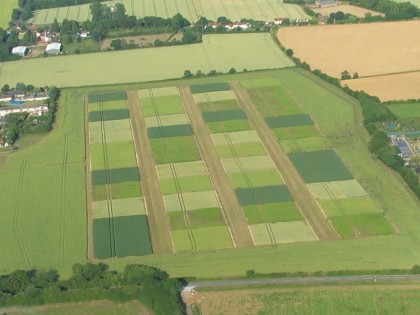
Seminar video now avialable
The Sustainability Trial in Arable Rotations (STAR) is a long-term fully replicated field-based study which started in 2005.
Following the wheat in 2023 the STAR project is in the break cropping year. The seminar speakers and topics covered were:
- Nathan Morris (NIAB) - Overview of the STAR project outlining the project treatments and brief history, plus the impact of prolonged rainfall on cropping and soil structure during the 2023/24 season.
- Lydia Smith (NIAB) - Lydia introduced The Centre for High Carbon Capture Cropping (CHCx3) which is a four-year, multi-partner project . The research aims to help UK farmers and growers target Net Zero and build farming resilience through diversifying their arable and forage cropping. Lydia then gave overview of using herbal leys that contain a diverse species including grasses, legumes and herbs and discussing some of the benefits of herbal leys in terms of soil, environment and animal health, resource conservation, and biodiversity enhancement
- David Clarke (NIAB) - Cropping system models to support N management.
More on STAR
- NEW as part of The Centre For High Carbon Capture Cropping (CHCx3) that will investigate how rotational use of herbal leys could increase soil organic carbon and improve system resilience
- The research examines the interaction between four different cultivation methods and four crop rotations on a heavy Hanslope soil type
- The project uses farm scale equipment on large field plots
- Long-term rotation studies are rare in our industry but they provide powerful agronomic and financial information for UK farmers
STAR PROJECT OVERVIEW
- The STAR project is a long-term rotational systems study examining the interaction between four different rotations and four different cultivation methods
- The impact of rotation and cultivation on weed burden, soil structure and mycotoxin risks are becoming increasingly apparent as the study progresses
- Considering yields over all crops in the rotation, the difference between cultivation systems is small. The ploughbased cultivation system is tending to give the highest yields but margin is barely distinguishable across systems
- Tillage decisions seem to be more critical in break crops. Rotational choices have tended to have a bigger impact on margin than primary tillage decisions; with winter cropping rotations giving the higher margins
STAR TREATMENTS
The study has a total of sixteen treatments and three replicates. Four rotations, four cultivation systems
Winter Cropping
Spring Cropping X
Continuous winter wheat
Rotational herbal ley
Annual Plough
Deep Tillage
Shallow Tillage
Managed Approach
The STAR project is supported by The Morley Agricultural Foundation, The Felix Thornley Cobbold Trust and, historically, The Chadacre Agricultural Trust. The STAR project continues to contribute to wider collaborative research and is used as a platform for educational studies at both under-graduate and post-graduate level. This open event is provided as part of the Morley LoTS initiative; NIAB working with The Morley Agricultural Foundation and Morley Farms to deliver a unique and impartial agronomy focused training, research and education capability in East Anglia.
